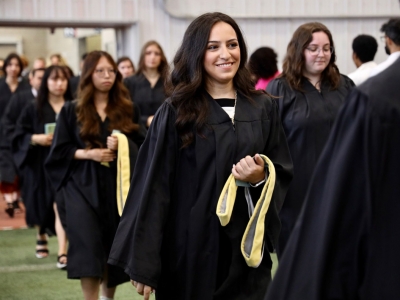Thirteen Carleton University faculty members received approximately $750,000 from the Social Sciences and Humanities Research Council (SSHRC) Insight Development Grants to support a broad range of research, including work on parenting Olympic hopefuls, social media influencer marketing, cybersecurity risk, augmented reality (AR) and language learning, and music and Canadian society.
“This important work is an example of the research supported in our new Strategic Integrated Plan (SIP),” said Rafik Goubran, vice-president (Research and International). “The SIP emphasizes leveraging the power of Carleton research to solve critical issues. We want to thank SSHRC for supporting these interdisciplinary, collaborative projects.”
Carleton’s Francine Darroch, professor in the Department of Health Sciences, is investigating the impact Olympic-level athletes and the media have on maternity and parenting policies. While there have been highly publicized stories regarding new athlete mothers, elite athlete fathers face a largely undocumented toll. While pregnant and postpartum elite athlete mothers have bodily experiences that affect their performance in ways that father athletes do not, the absence in media and scholarly research on the impact on these fathers assumes they are unaffected by their children’s birth. Darroch’s research will enable corporate sponsors and agents of elite parent athletes to become more responsive to their needs.
Samira Farivar, professor in Carleton’s Sprott School of Business, is investigating influencer-follower relationships on social media, where influencers have a sizable network of followers and possess the ability to affect their followers’ opinions, behaviors and purchase decisions. Businesses and influencers are looking for ways to enhance their marketing effectiveness. Followers, on the other hand, have their wellbeing profoundly affected by their social media activities.
The research results will provide valuable learning and guidelines for businesses, social media influencers, users and social media developers. It will inform businesses and social media influencers on how to enhance their marketing efforts and collaborations. It will also educate and enable social media users to enhance their wellbeing by monitoring and managing their activities. Farivar will provide guidelines to social media developers and platforms to design better social media features, functions and services.
In a recent report published by Risk Based Security, Canada was ranked third after the United States and the United Kingdom for the number of data breaches reported in 2018. This news emphasizes the importance of cybersecurity preparedness in Canadian society, including Canadian businesses. Maryam Firoozi, a professor in the Sprott School of Business, is investigating how Canadian firms disclose cybersecurity risk information and whether this information has any substance. This is the first comprehensive study on cybersecurity risk disclosure practices of Canadian firms. Firoozi’s results will be timely and informative for policy-makers, IT security and risk management experts, and other stakeholders.
AR is an interactive experience in a real-world environment which involves “augmenting” physical spaces or objects with computer-generated information. Victoria McArthur, professor in the School of Journalism and Communication, wants to establish best practices and guidelines to ensure usability, accessibility and effective teaching design when using AR in language education. While such guidelines exist for educational games and for AR in general, there is no framework to support non-game based AR for language learning. McArthur will develop an interdisciplinary framework to support the design of future educational AR applications to best aid students.
Carleton’s Ellen Waterman, the Helmut Kallmann Chair for Music in Canada, will create a community engaged model of research creation (CERC) suitable for exploring the relationship between music and questions of importance to Canadian society, especially access and equity in music and, by extension, social inclusivity. She will collaborate with the Carleton University Art Gallery (CUAG), and musicians from the 2SLGBTQ+ and Deaf communities to co-create music in response to two group exhibitions at CUAG.
By combining insights from existing musical models of research creation, practice-based research and artistic research with participant action research and performative ethnography, a CERC will be positioned to explore research questions that emerge out of the dynamics of collaboration.
Media Contact
Steven Reid
Media Relations Officer
Carleton University
613-265-6613
Steven.Reid3@carleton.ca
Follow us on Twitter: www.twitter.com/Cunewsroom
COVID 19 Updates: https://newsroom.carleton.ca/coronavirus-covid-19/messages/
Monday, October 19, 2020 in News Releases
Share: Twitter, Facebook



